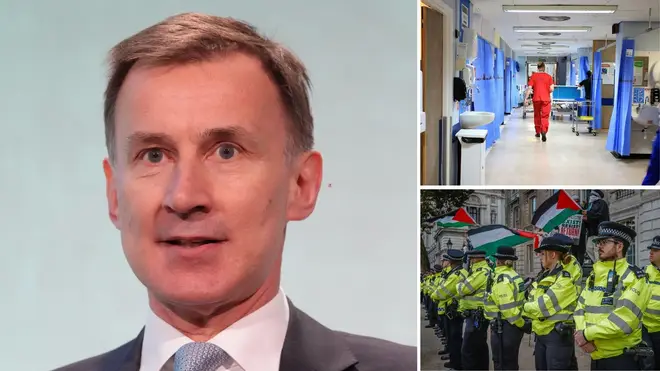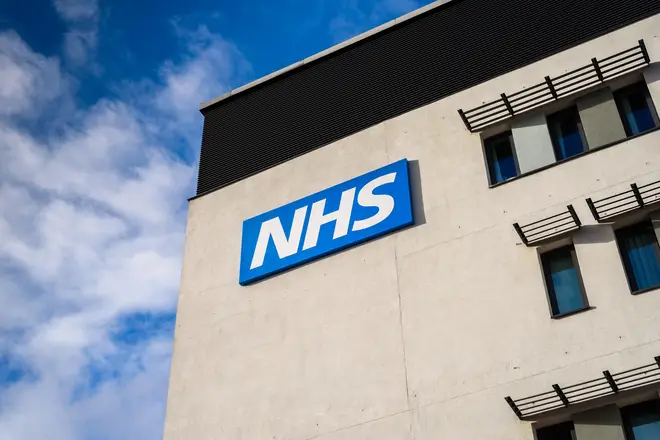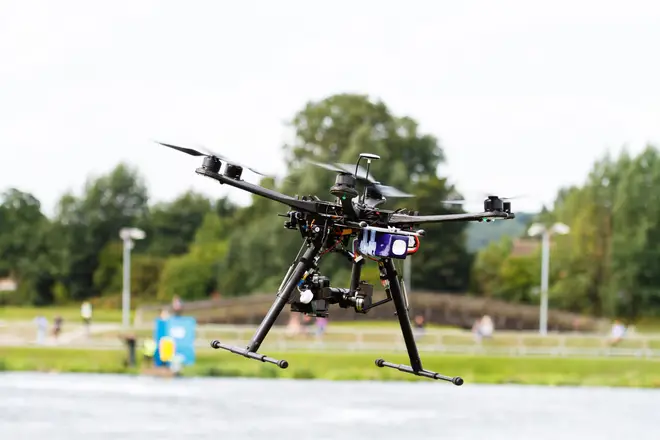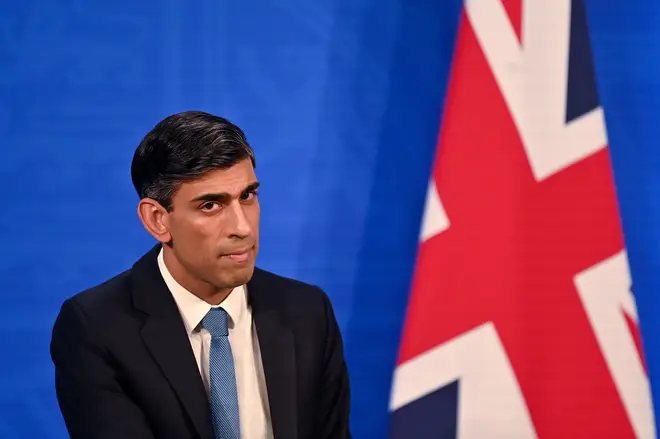
Shelagh Fogarty 1pm - 4pm
3 March 2024, 10:28 | Updated: 3 March 2024, 10:47

Chancellor Jeremy Hunt has played down the chances of tax cuts in the upcoming Budget, saying any changes will be "prudent and responsible".
Speaking to LBC's Matthew Wright, Mr Hunt said his priority was helping people with cost of living pressures.
He said his Budget was intended to help grow the economy in the long-term, allowing for tax cuts later.
"Overall, I think what people want is not gimmicks, they want a long-term, responsible, sensible plan to grow the economy so we can bring down taxes and have enough money for public services in the future - and that's what I'll be delivering," he said.
Mr Hunt continued to say his approach to cutting tax is "very straightforward".
"If you look around the world, the countries that are growing the fastest tend to be the ones with lower taxes," he said.
"We need to boost our growth... but I will only ever cut taxes in a way that is prudent, responsible and affordable.
"It would be completely the wrong thing to fund tax cuts by borrowing more because you're just passing on the pressure to future generations."
Addressing funding for public services, Mr Hunt added: "We need to be much better at spending taxpayers' money more efficiently."
"There’s always a reflex to pour more money in and they’ll get better and that hasn’t been the case with some of our biggest public services since the pandemic," he went on to say.
"What we've got to learn to do is run public services more efficiently because if we don’t we’ll end up with taxes not just staying high but getting higher – that will throttle economic growth."
Read more: Hunt's AI revolution: Budget to add £800m of new tech to slash NHS backlog and free up police time

Chancellor Jeremy Hunt joins Matthew Wright ahead of the Budget
It comes after the Chancellor said there is "too much waste in the system" as he announced that he is seeking to employ drones and artificial intelligence (AI) to free up public sector times.
The Treasury has said the changes, due to be in Wednesday's Budget, have the potential to deliver £1.8 billion worth of benefits to public sector productivity by 2029.
Officials said the move is about reversing the high spending, high tax approach the UK Government adopted to see the country through the coronavirus pandemic and the energy shocks sparked by Russia's invasion of Ukraine.
Mr Hunt said: "We shouldn't fall into the trap of thinking more spending buys us better public services.
"There is too much waste in the system and we want public servants to get back to doing what matters most: teaching our children, keeping us safe and treating us when we're sick.

"That's why our plan is about reaping the rewards of productivity, from faster access to MRIs for patients to hundreds of thousands of police hours freed up to attend burglaries or incidents of domestic abuse."
As part of the Treasury reforms, drones will assess incidents such as traffic collisions and artificial intelligence (AI) will be deployed to cut scan times by a third.
In the health sector, the Treasury said that more than 130,000 patients a year, including those waiting for cancer results, can expect to receive their test results sooner as a result of at least 100 MRI scanners in England being upgraded with AI.
The pioneering technology will be trained to recognise patterns in scans through machine-learning which officials said could cut scan times by over a third.
In policing, the Treasury said its reforms will help to deliver on the Police Productivity Review, which it said found that up to 38 million hours of officer time could be saved every year.
Mr Hunt will provide £230 million towards the rollout of time-saving technology, including funding automated redaction of personal information during evidence collation.
The process will apply to name badges in shoplifting incidents, irrelevant faces from body worn cameras and number plates from video evidence.
Interviewing witnesses and victims via video call will be approved to improve speed of service.

A pilot allowing officers to use drones to first respond to some incidents like traffic collisions will also be given the green light.
The drone information will be fed back to help forces to assess the seriousness of the incident and the resources required to deal with it, the Treasury said.
AI will be used on the 101 non-emergency service to triage callers, it added.
Other measures in the £800 million package include:
Darren Jones, Labour's shadow chief secretary to the Treasury, said the announcement mounted to "spin without substance".

"Nothing in Britain is better off after 14 years of Conservative economic failure," he said.
"Millions of people are stuck on hospital waiting lists, our schools are crumbling and our streets are less safe. And yet all the Chancellor is offering is more spin without substance.
"It's time for change. Only Labour offers a long-term plan to grow our economy to deliver more jobs, more investment and to put more money in people's pockets."
Mr Hunt is under pressure to deliver tax cuts in what could be the last fiscal statement from the Conservative government before the next general election, which is widely expected in the autumn.
With the Chancellor number-crunching over the coming days before finalising his Budget, official forecasts of the Chancellor's "head room" against his plans to get borrowing to fall in five years' time are understood to have moved against the Government.
Treasury sources this week said Mr Hunt is considering a further squeeze on public spending as a way to deliver the tax cuts being demanded by some Tory MPs.
The announcement about bolstering public sector productivity could be a move designed to free up money for pre-election giveaways.